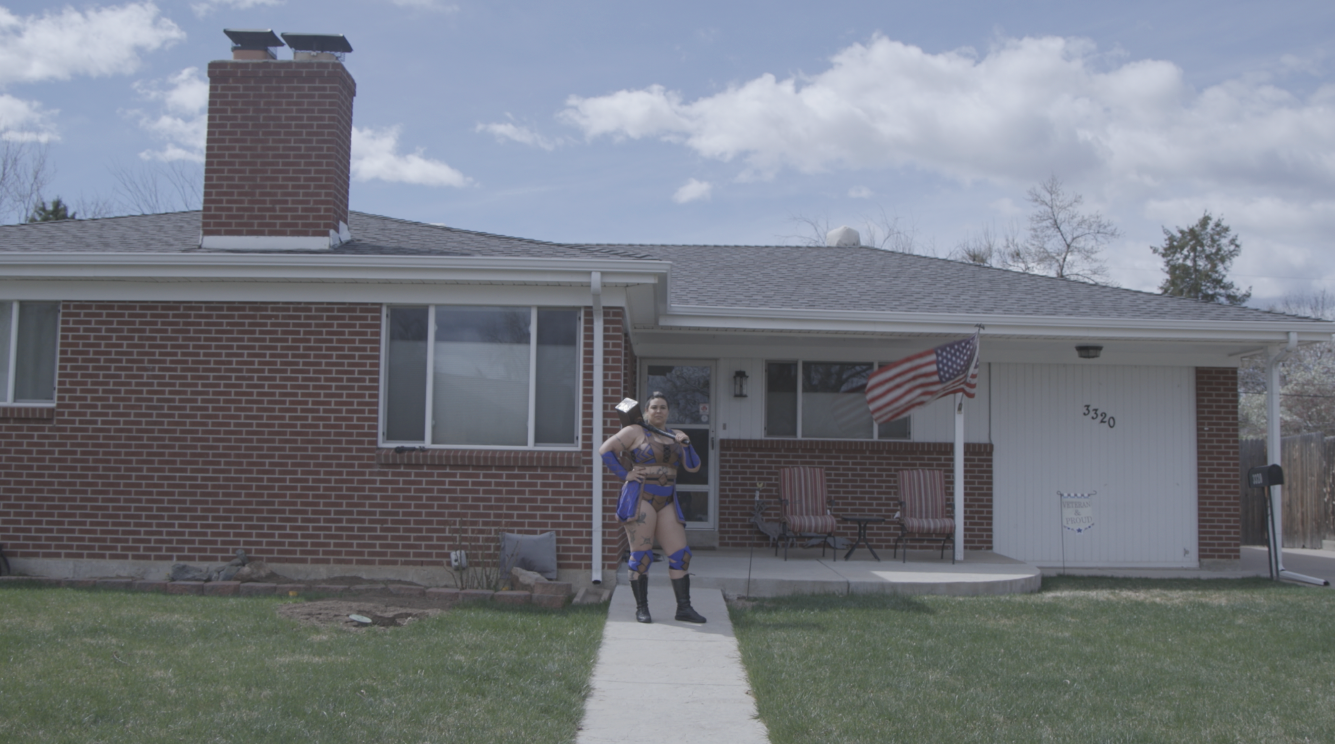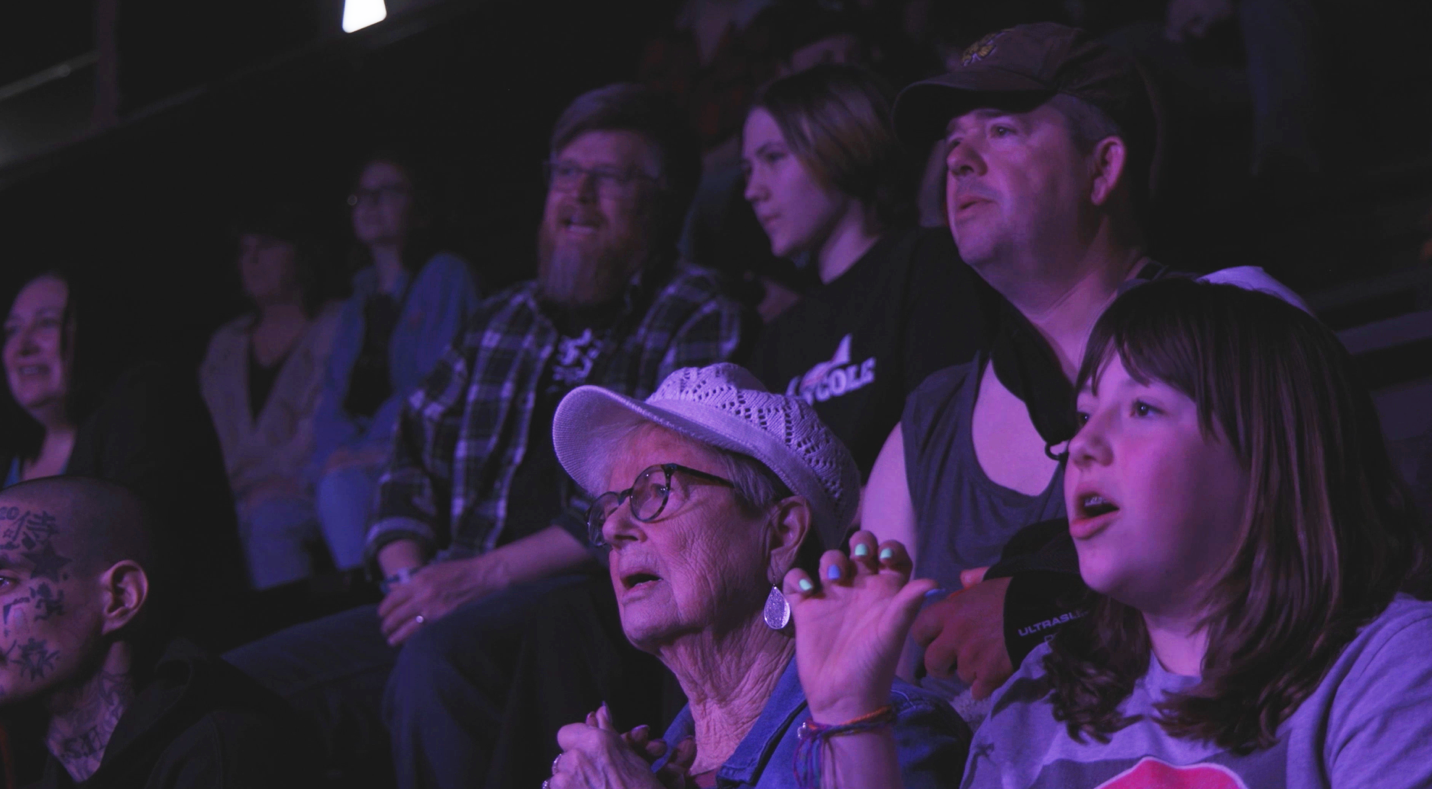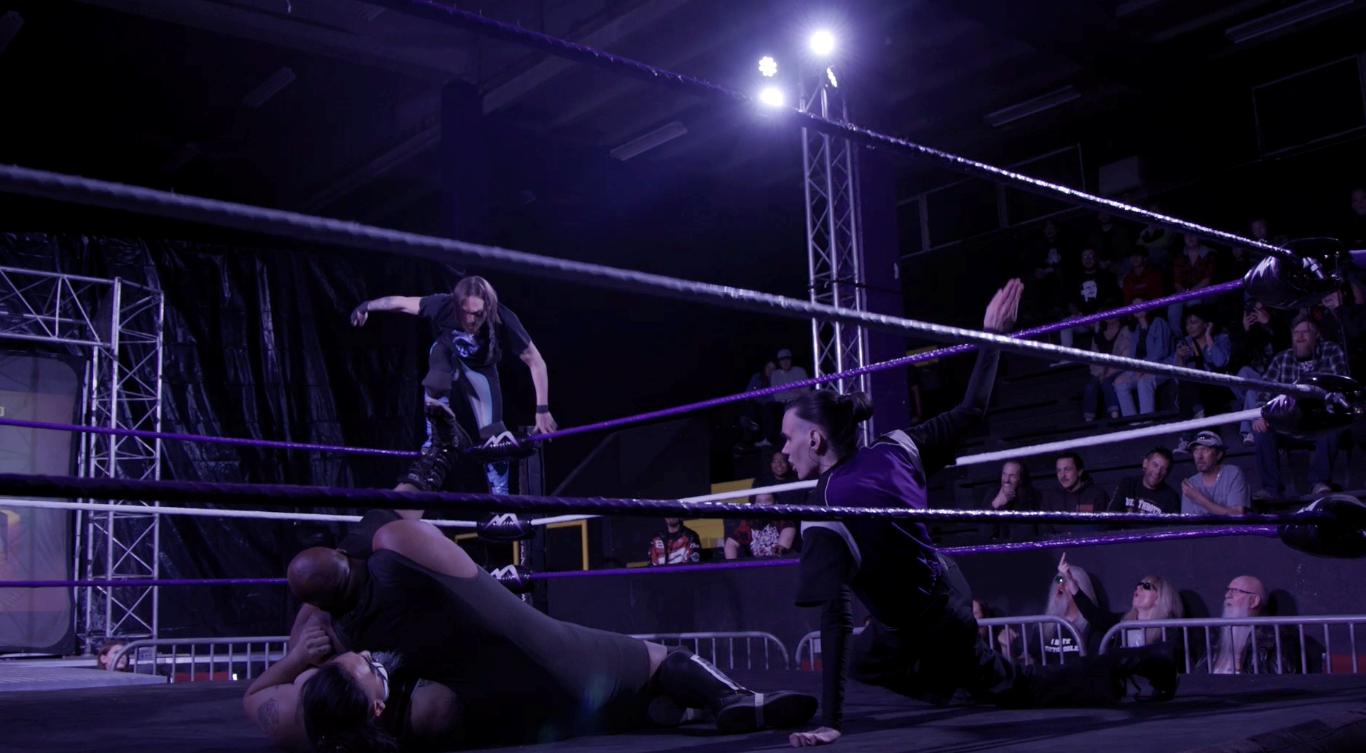Welder to wrestler: Colorado's Warhammer finds her audience

GOLDEN, Colo. — Italian power metal music blasts as Lilith Gimm, "The Warhammer," walks into the ring carrying an outsized hammer the size and weight of a cinder block.
Sparks of hot metal fly into the air as she slashes the hammer with an angle grinder. The fiery spectacle lights up the faces in the audience, sending the crowd into a frenzy of shouting and booing.
Lilith Grimm is about to go head-to-head with her rival for the past three years, Marionette Noelle. Lilith and Noelle started off as friends when Noelle began wrestling a few years ago. Their relationship changed however, when Noelle was taken by the asylum and her brain was destroyed— she has not been the same since.
“I tried so hard to save Noelle, we went to therapy, and she just kept turning on me,” said Lilith.
She hopes tonight at the championship match they can settle the score once and for all.
In her daily life, she’s Cerra Reichel-Hodges, but in the ring, as a full-time professional wrestler, she is the Warhammer.
“I’m a dwarven blacksmith from Azeroth,” Reichel-Hodges said.
“I am a high fantasy dwarf that has a hammer. That's who I am now, and honestly, that's all I've always been.”

Cerra Reichel-Hodges is a professional wrestler based in Denver.
Photo: Lizzie Mulvey, Rocky Mountain PBS
The Warhammer is her gimmick — her in-ring persona. Before becoming a full-time pro-wrestler, she worked as a blacksmith and a welder.
“The best character is you just turned up a little bit,” said Reichel-Hodges. It follows that she forged the hammer she uses in the ring from metal herself.
Professional wrestling in the U.S. initially started as a sideshow attraction and grew dramatically in popularity throughout the 1940s, the first golden age of professional wrestling.
Today, most people know that pro-wrestling is staged, but for decades, the industry worked hard to maintain kayfabe, the act of concealing the prefabricated storylines and fixed matches, according to Russell Gilbert’s article, Performance and Professional Wrestling.
Only during the second golden age of pro-wrestling, the 1980s, did the mask start to come off, when two famed pro-wrestlers were pulled over on the Garden State Parkway and arrested for drug possession in 1987. The most scandalous part, however, was the fact that these two arch-rivals, the villainous anti-American Iron Sheik and Hacksaw Jim Duggan, were driving together, according to Jim Duggan’s memoir.
Viewers were not deterred—the sport’s popularity continued to climb, as did the public’s ability and desire to suspend disbelief.

"The crowd is as essential to us as we are to you. There is no wrestling without the crowd,” said Reichel-Hodges.
Photo: Lizzie Mulvey, Rocky Mountain PBS
“We are superheroes that you get to be five feet away from, we’re athletes that go out and do these magnificent feats that the normal person can't perform,” said Reichel-Hodges.
“You don't have to think about your day job anymore. You don't have to think about your boss that you don't want to talk to. You get to just be there and be a part of it and be a part of victory and loss and storytelling.
Reichel-Hodges began wrestling almost five years ago and has spent most of her career training at Rocky Mountain Pro, a wrestling promotion and school based in Denver.
She works out four times a week on average with a focus on strength training and conditioning as well as tumbling and fall training.
The gear she wears to shows was custom-made for her body by a gear-maker based in Colorado while her wrestling boots are sourced directly from Mexico.
“Luchas know what they’re doing when they made boots,” Reichel-Hodges said.
Across the state, there are four professional wrestling schools. Rocky Mountain Pro is the biggest promotion and runs about 60 events a year and hosts one of the only television shows, said Matthew Yaden, the founder and owner.
The school’s training specializes in performing for television, which is a completely different animal, said Reichel-Hodges.
“Knowing how to find the cameras and knowing when the moments need to breathe, knowing how to take a moment so the photographers can get that picture.”
The match against Marionette Noelle is both a televised and live event organized by Rocky Mountain Pro called Never Broken, airing monthly on pay-per-view, YouTube, and other platforms.
The school helps prepare wrestlers for bigger stages such as WWE, which Reichel-Hodges hopes to get to one day.

Rocky Mountain Pro is the biggest promotion in Colorado and runs about 60 events a year.
Photo: Lizzie Mulvey, Rocky Mountain PBS
Life as a pro-wrestler for Reichel-Hodges requires frequent travel and excessive strain on the body. She performs between 150 to 200 shows a year, sometimes three to four shows in one weekend.
“As much as people want to say that wrestlers don't put their bodies at risk, absolutely they are,” she said. She landed wrong on a move a couple of months ago and fractured her elbow. More recently, she made a slightly wrong move, and may have torn her meniscus tendon, she said.
Reichel-Hodges currently works full-time as an independent contractor, managing all her own bookings and negotiating pay with promoters for each show. She typically gets several hundred dollars with travel expenses covered per show, but payment can vary dramatically. As an independent contractor, she is responsible for covering all injury-related costs herself.
Being raised by a single mom has been a major source of inspiration for her wrestling career, she said. Reichel-Hodges was born in California on an army base, where her mom worked at the time. At four-years-old, her mom sent her to live with her grandparents in Colorado before they reunited a year later.
“She taught me how to be independent and she taught me to never give up. And that women can be just as tough as men,” Rechel-Hodges said.
“Women can do anything,” she said.
During the 2020 lockdowns, Reichel-Hodges was not getting many welding jobs, and had nothing else to do but workout, she said. She gained about 60 pounds of muscle that year and started wrestling full-time.
"I did my first show, slapped a six-foot seven man in the face and was like, yeah, this is my calling.”
Lizzie Mulvey is the executive producer of investigative journalism at Rocky Mountain PBS. Lizziemulvey@rmpbs.org
